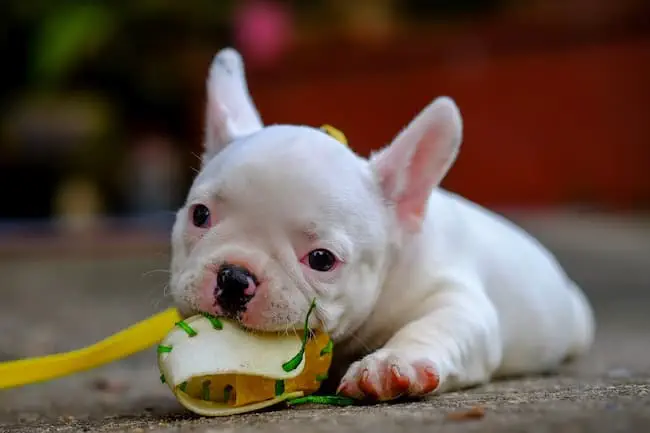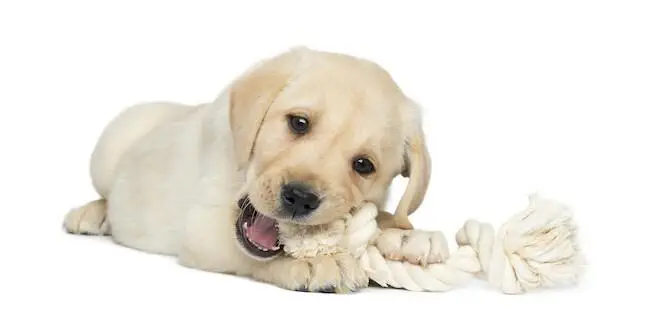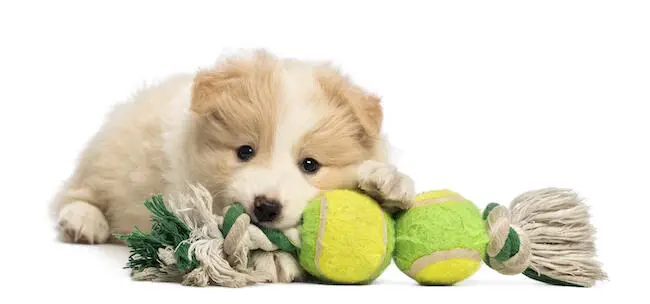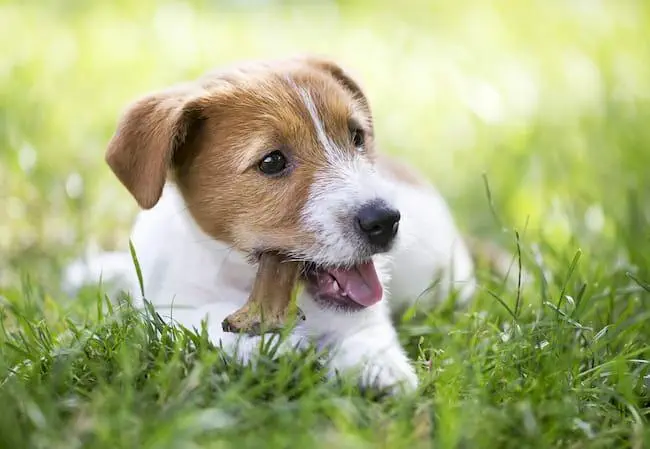Similar to human babies, puppies also go through a teething process in which they grow and lose baby teeth.
Unlike human babies, this is a pretty fast process. From birth to eight months they will go from having no teeth at all to having a full set of 42 adult teeth!
In their two stages of teething, pups will typically suffer from sore gums and will begin to chew any object they can get their paws on, so it’s vital to have some chew toys handy!
To best handle this feisty phase of their young life, it’s important for puppy owners to get the full lowdown on their dog’s teething process, so you can prevent pain and put a stop to their destructive behaviour!
Puppy teething symptoms
Although every dog goes through teething, it is a more uncomfortable process for some than others.

It can also be a disconcerting time for new dog owners, as some of the symptoms associated with the process can make them anxious about their pup’s health.
But if you notice any of the following issues, please don’t worry, as every dog goes through the same thing!
- Drooling
- Excessive chewing
- Pawing at the mouth
- Leaving blood spots behind after chewing items
How to help a puppy through teething
Thankfully, you don’t need to worry too much about your dog during this time, as the pain and discomfort associated with teething are largely exaggerated.
However, there’s no doubt that they find it irritating, hence why they try to chew up your whole home.
So to save your furniture and ease your pup’s mind, there are a few things you can do to help you both through this tricky time.
Chew toys
Naturally, it’s a lot more preferable if your canine chews their way through a set of specially designed puppy chew toys as opposed to your cushions and shoes.
With positive reinforcement, you can let your dog know that they are allowed to chew toys to their heart’s content, while other items are off-limits!
Utilising your freezer
Just like when we reach for a bag of frozen peas to soothe our bangs and bumps, cold items can be really comforting for sore gummed dogs.
Things like frozen carrots or ice cubes can bizarrely become one of their favourite things to chew, or you could just run their toys under a cold tap!

Gates & pens
More for you than them, a puppy pen or dog gate can help keep your pup shut away from accident areas they just can’t help chewing up.
Puppy teething gel
If your little nipper has visibly sore, red gums or is in a non-stop chewing mode, puppy teething gel can help numb their gums and alleviate the pain.
Puppy teething FAQ
When do puppies start teething?
Puppies are born with no teeth and actually begin their first teething stage at 2 weeks old!
This is the point where all their baby teeth come through. However, unless you are raising the puppy from birth, it’s unlikely you’ll experience this first round of teething.
Their second round of teething is the process in which they lose their baby teeth and adult gnashers begin to come through. This will usually occur at around 12 to 16 weeks old.
For most owners, this is the period of time we most commonly associate with teething. Most puppies don’t enter family homes until they are around 8 weeks old.
When do puppies lose their teeth?
Between 12 and 16 weeks, puppies begin to lose their 28 baby teeth.
This is a very sore time for young dogs and it’s at this stage where they’ll begin to reenact those tales of terrible teething dogs you were warned about.

But it’s important to remember that your puppy isn’t gnawing and nibbling on everything in sight because they’re a nuisance. They’re doing it because they’re in pain.
By chewing on things, it helps alleviate their sore gums. So it’s important to teach them what is on and off-limits when it comes to biting.
For example, a chew toy… Yes! But your slippers… No!
By 6 months of age, all of their baby teeth should have fallen out. If any remain, you’ll have to contact your veterinarian as they may need to be professionally removed.
How long do puppies teeth for?
The average teething process for a puppy is around 8 months.
Although this might seem like a long process, puppies actually lose baby teeth and grow 42 adult teeth incredibly quickly, especially when you consider most human children don’t get adult teeth until 13 years old.
During these 8 months, it’s perfectly natural to find discarded baby teeth on the floor or bloody marks on your pup’s chew toys. There’s no need to be anxious or worried about your little furball.
However, it’s admittedly not a very nice time for your young dog and it can often be a battle trying to stop them chewing everything in sight!
It’s only natural you want to know how much more you’ve got to put up with. So to find out which stage of the process your pup is at, consult our handy guide below!

Puppy teething timeline
Birth to 2 weeks old
Puppies are born with no teeth and so for the first 2 weeks of their life, you won’t see any symptoms.
2 to 4 weeks old (First Stage/Baby Teeth)
This is the stage where puppies will begin to grow their baby teeth. The first to erupt will be the incisors, followed by premolars, molars and canines. This is a painful and irritating time for pups, so make sure to provide plenty of chew toys!
4 to 8 weeks old
At this time, a puppy should gain all 28 of its baby teeth. By the end of this stage, you may notice their baby teeth have begun to fall out.
8 to 12 weeks old
There will be little change here, apart from the occasional baby tooth falling out
12 to 16 weeks old (second stage)
Here the canine’s adult teeth begin to erupt, pushing baby teeth out. This is a painful and irritating time for pups, so make sure to provide plenty of chew toys!
16 to 26 weeks old
Depending on how long it takes for all their baby teeth to fall out, this painful stage of teething could last anywhere between 1 to 3 months for your pup!
6 months old
After 26 weeks, your puppy should have lost all their baby teeth, and many of their adult teeth will be fully grown or visibly coming through.
8+ months old (adult teeth)
At 8 months old your dog should have all of its adult teeth, and so it might be time to start finally treating them like one!
When do puppies stop teething?
By 8 months old your pup will have all their adult teeth, and so naturally the symptoms of sore gums will no longer be affecting them. This means no more drooling, blood or more importantly, pain for your pup!
However, we can’t promise they won’t still love a good chew! Still have plenty of chew toys and dental sticks to hand, and remember that you will need to start their tooth-cleaning journey around now too.

